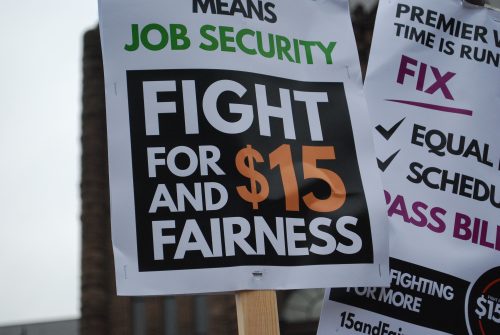The road to every working American being able to afford their basic needs took a big leap forward last week when Illinois Governor J.B. Pritzker signed legislation to raise the state’s minimum wage to $15 an hour by 2025. Illinois now joins the growing number of states who are listening to the concerns of their workers and challenges they face from rising wealth inequality and wage stagnation.
Introduced to the floor in early February, the bill was passed quickly in both houses and given to the governor, who broke from his predecessor’s veto of similar legislation last year to sign it into law. Such swift action could not be possible without the tireless efforts of local organizers and Illinois workers. Looking back only six years ago when the fight first began, a bill introduced to increase the wage to $10 was struck down without even receiving a vote in either chamber. Repeated efforts in 2015 and 2017 were also squashed with similar vigor, but thanks to years of hard work, over 1 million Illinoisans will now be getting a raise over the next 6 years.
Not all Illinoisans are celebrating this victory, however. Wealthy corporations and their mouthpieces like the Chamber of Commerce continue to spew their typical inflated fears over the loss of jobs and business, the same tired argument that has been used repeatedly to derail legislation for minimum wage increases across the nation. It was even brought up just days after this bill passed the Senate, when business leaders held a press conference prophesying economic ruin from potential layoffs and closures at their businesses. It’s telling, however, that with four states and numerous cities having already passed $15 an hour legislation, we’ve yet to see any of the fire and brimstone that Republicans lawmakers and their wealthy corporate donors claim will destroy business.
What we have seen is widespread agreement among most mainstream economists that raising the wage has minimal to no impacts on unemployment and also increases the average income of low wage earners.
Reversing decades of pay inequality also helps elevate the decades of economic oppression people of color have faced in Illinois. Nearly 41% of all workers in Illinois make less than $15 an hour, and of those 48% are Black and 61% are Latino. Shrinking the pay gap that people of color disproportionately suffer from will not only help today’s workers, it will also impact future generations by putting more money in the wallets of parents to spend on their children. To put it simply: more money means more economic opportunities.
Legislation like this is sorely needed in communities and states across the country. Working Americans are working harder and falling further behind. Low wage workers earn less per hour than their counterparts did 50 years ago. Putting money directly in their hands not only drastically improves their livelihoods, but will improve the overall economy with increased consumer spending. But with the success of Illinois and the federal Raise the Wage Act moving its way through congressional committees, a fair minimum wage is moving from dream to reality for millions, with widespread support from the American people. The majority of voters support a $15 wage and pressure is mounting on the Senate to pass the bill that would lift millions of American families out of poverty.
And in case any members of Congress forgot, let’s be clear; no working American should be living in poverty, period.
